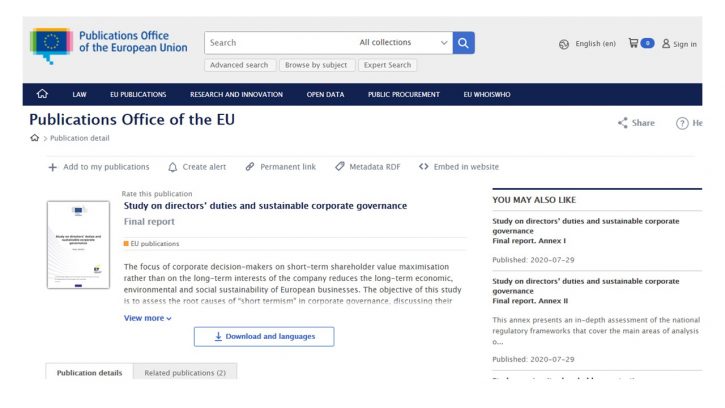devoirs des administrateurs Gouvernance mission et composition du conseil d'administration Normes d'encadrement normes de droit normes de marché Responsabilité sociale des entreprises Valeur actionnariale vs. sociétale
Étude de l’UE sur les devoirs des administrateurs : une gouvernance loin d’être durable !
Ivan Tchotourian 12 août 2020 Ivan Tchotourian
Belle étude qu’offre l’Union européenne sur les devoirs des administrateurs et la perspective de long-terme : « Study on directors’ duties and sustainable corporate governance » (29 juillet 2020). Ce rapport document le court-termisme de la gestion des entreprises en Europe. En lisant les grandes lignes de ce rapport, on se rend compte d’une chose : on est loin du compte et la RSE n’est pas encore suffisamment concrétisée…
Résumé :
L’accent mis par les instances décisionnelles au sein des entreprises sur la maximisation à court terme du profit réalisé par les parties prenantes, au détriment de l’intérêt à long terme de l’entreprise, porte atteinte, à long terme, à la durabilité des entreprises européennes, tant sous l’angle économique, qu’environnemental et social.
L’objectif de cette étude est d’évaluer les causes du « court-termisme » dans la gouvernance d’entreprise, qu’elles aient trait aux actuelles pratiques de marché et/ou à des dispositions réglementaires, et d’identifier d’éventuelles solutions au niveau de l’UE, notamment en vue de contribuer à la réalisation des Objectifs de Développement Durable fixés par l’Organisation des Nations Unies et des objectifs de l’accord de Paris en matière de changement climatique.
L’étude porte principalement sur les problématiques participant au « court-termisme » en matière de droit des sociétés et de gouvernance d’entreprises, lesquelles problématiques ayant été catégorisées autour de sept facteurs, recouvrant des aspects tels que les devoirs des administrateurs et leur application, la rémunération et la composition du Conseil d’administration, la durabilité dans la stratégie d’entreprise et l’implication des parties prenantes.
L’étude suggère qu’une éventuelle action future de l’UE dans le domaine du droit des sociétés et de gouvernance d’entreprise devrait poursuivre l’objectif général de favoriser une gouvernance d’entreprise plus durable et de contribuer à une plus grande responsabilisation des entreprises en matière de création de valeur durable. C’est pourquoi, pour chaque facteur, des options alternatives, caractérisées par un niveau croissant d’intervention réglementaire, ont été évaluées par rapport au scénario de base (pas de changement de politique).
Pour un commentaire, voir ce billet du Board Agenda : « EU urges firms to focus on long-term strategy over short-term goals » (3 août 2020).
À la prochaine…
Gouvernance Nouvelles diverses Valeur actionnariale vs. sociétale
Court-termisme : les propositions de The Aspen Institute
Ivan Tchotourian 2 janvier 2017
The Aspen Institute (par l’intermédiaire de The American Prosperity Project Working Group) vient de publier un rapport proposant de contrer le court-termisme qui gangrène les entreprises américaines. Dans « The American Prosperity Project: Policy Framework », le groupe de travail propose 3 pistes de solutions qui sont les suivantes :
- Focus government investment on recognized drivers of long-term productivity growth and global competitiveness—namely, infrastructure, basic science research, private R&D, and skills training—in order to close the decades-long investment shortfall in America’s future. Building this foundation will support good jobs and new business formation, support workers affected by globalization and technology, and better position America to address the national debt through long-term economic growth.
- Unlock business investment by modernizing our corporate tax system to achieve one that is simpler, fair to businesses across the spectrum of size and industry, and supportive of both productivity growth and job creation. Changes to the corporate tax system could reduce the federal corporate statutory tax rate (at 35%, the highest in the world), broaden the base of corporate tax payers, bring off-shore capital back to the US, and reward long-term investment, and help provide revenues to assure that America’s long-term goals can be met.
- Align public policy and corporate governance protocols to facilitate companies’ and investors’ focus on long-term investment. Complex layers of market pressures, governance regulations, and business norms encourage short-term thinking in business and finance. The goal is a better environment for long-term investing by business leaders and investors, and to provide better outcomes for society.
Pour une synthèse de ce rapport de travail, vous pourrez lire cet excellent article d’Alana Semuels dans The Atlantic « How to Stop Short-Term Thinking at America’s Companies » (30 décembre 2016).
There was a time, half a century ago, when what was good for many American corporations tended to also be good for America. Companies invested in their workers and new technologies, and as a result, they prospered and their employees did too.
Now, a growing group of business leaders is worried that companies are too concerned with short-term profits, focused only on making money for shareholders. As a result, they’re not investing in their workers, in research, or in technology—short-term costs that would reduce profits temporarily. And this, the business leaders say, may be creating long-term problems for the nation.
“Too many CEOs play the quarterly game and manage their businesses accordingly,” Paul Polman, the CEO of the British-Dutch conglomerate Unilever, told me. “But many of the world’s challenges can not be addressed with a quarterly mindset.”
Polman is one of a group of CEOs and business leaders that have signed onto the American Prosperity Project, an initiative spearheaded by the Aspen Institute, to encourage companies and the nation to engage in more long-term thinking. The group, which includes CEOs such as Chip Bergh of Levi Strauss and Ian Read of Pfizer, board directors such as Janet Hill of Wendy’s and Stanley Bergman of Henry Schein, Inc., and labor leaders such as Damon Silvers of the AFL-CIO, have issued a report encouraging the government to make it easier for companies to think in the long-term by investing in infrastructure and changing both the tax code and corporate governance laws.
À la prochaine…
Ivan Tchotourian
Gouvernance normes de droit Valeur actionnariale vs. sociétale
Is short-termism wrecking the economy?
Ivan Tchotourian 20 août 2015
Dans une entrevue sur la BBC (ici), Le chef économiste de la Banque d’Angleterre (Andy Haldane) a livré une belle critique du court-termisme invoquant le fait que les sociétés devraient investir davantage dans le futur plutôt que verser des dividendes en argent aux actionnaires ou de racheter leurs actions. Très intéressant à lire !
Morceaux choisis :
Last Friday on Newsnight the Bank of England’s chief economist Andy Haldane sought to kick-start a debate on how companies run themselves. He told me that companies risk « eating themselves » as shareholders and management were gripped by a form of short-termism. Instead of investing in their futures firms are choosing to pay out too much of their cash to shareholders in the form of dividends or by buying back their own shares. (…)
It’s perfectly possible that shareholders might be too powerful and too disinterested. The issue could be that management is too focussed on short-term shareholder returns and so prioritises returning cash to them and increasing the share price in the short term, even if that isn’t in the company’s long-term interest. (…)
To understand how this situation might have arisen over the last few decades, one only needs to look at two trends. As Haldane argued last week – shareholding periods have fallen. There are fewer and fewer investors willing to take a long-term view. And secondly the trend has been to increasingly tie top management payment to share price performance. In other words, whatever the long-term benefits of investment in machinery, research or training five or six years down the line, we may have a system in which the rational thing to do is to focus on the next six months, not the next six years. The possible fixes to this situation are many and varied – from embracing a Germanic system of stakeholder capitalism (in which the workforce as well as the owners have a role in decision making), to looking again at executive compensation or maybe to an intermediate situation – perhaps ordering directors to act in the interest of a theoretical « perpetual shareholder », rather than existing (often short-term) investors. None of those options are a quick fix, all involve reform of the Companies Act, which is a mammoth bit of legislation. (…)
This is a big agenda and a big debate. On one level it could even be described as an attempt to save capitalism from capitalists, an argument that the ultimate owners of capital have stopped working in their own long-term interest. But, perhaps in those terms, it sounds too radical. On a more micro level this is a debate about economic incentives. It may simply be that the incentive structure in Anglo-Saxon capitalism has become skewed towards rewarding short-term behaviour.
À la prochaine…
Ivan Tchotourian

